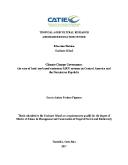Climate Change Governance: the case of land-use based emissions MRV systems in Central America and the Dominican Republic
Descripción
Tesis (Mag. Sc.) -- CATIE, 2017
Resumen
Measuring, reporting, and verifying (MRV) is a UNFCCC mechanism for monitoring climate
change mitigation and greenhouse gas emissions data. Although establishing MRV is a
priority in international discourse, it is a challenge for developing countries characterized by
poor governance and a historic lack of resources. This study is a Qualitative Comparative
Analysis (QCA) of six different countries in Central America and the Caribbean, aiming to
compare the different governance conditions limiting or facilitating the construction of robust
MRV systems in the region. Data collection involved reviewing information from secondary
sources complemented with interviews with technical experts throughout the region. The data
was prepared for analysis by selecting four final specific governance conditions through a
variable reduction process involving three prioritization filters. QCA results suggest that
“Institutionality and Coordination” and “Disclosure of Information for Transparency and
Accountability” are conditions that are associated with higher levels of capacity for the
construction of MRV. The absence of the condition “Institutionality and Coordination” is
associated with lower levels of capacities for MRV. These results imply that, although there
are many governance elements that are key for the design and construction of MRV in a
country, investing in institutional infrastructure is elemental for long-term success of MRV.
Palabras clave
Editor
CATIE, Turrialba (Costa Rica)
URI (Enlace permanente para citar o compartir este ítem)
https://repositorio.catie.ac.cr/handle/11554/8637Colecciones
- Tesis [3111]


